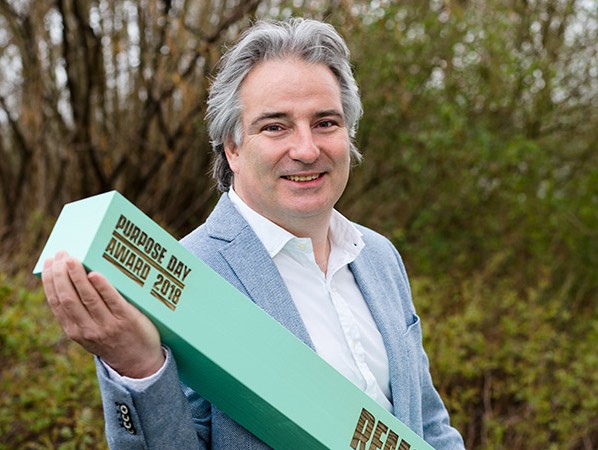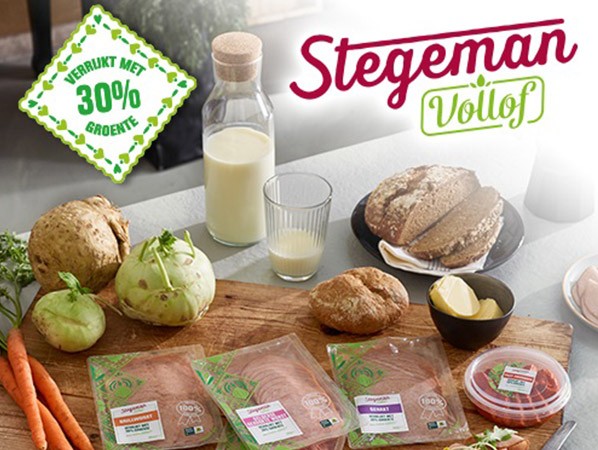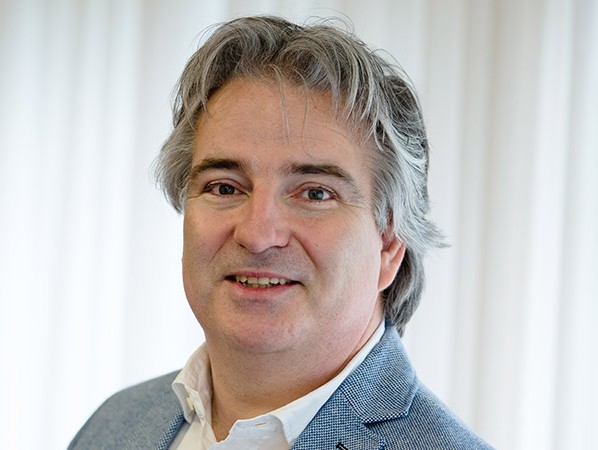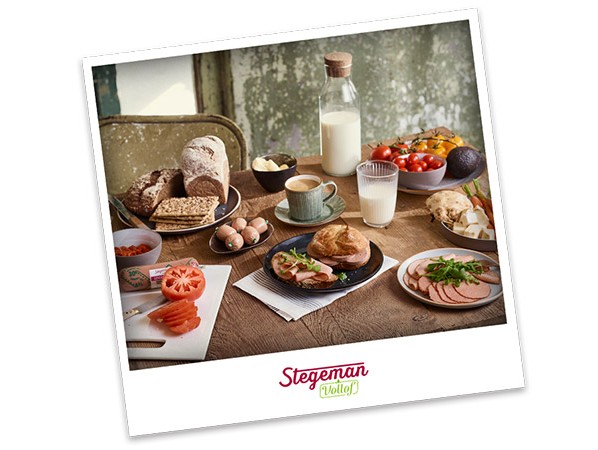
In November, he won the 'Purpose Award 2018': Remco Kok, CEO of Campofrio-Benelux, started a revolution at Stegeman and Imperial Meat Products. His goal: a fifty percent reduction of the amount of meat in their products by 2025. His invitation to the sector: "Join us!".
What kind of companies first come to mind when we talk about 'a revolution in the food products industry'? Probably De Vegetarische Slager (The Vegetarian Butcher), or Tony's Chocolonely, who have already made a name for themselves when it comes to food transition and corporate responsibility. We certainly don't think of Stegeman. Even so, the meat processing company, with a 160-year old history, put a radical dot on the horizon: a fifty percent reduction of the amount of meat in their products by 2025. Did we miss something, or is it Remco Kok's fault that we did not know this? "Well", he says in his office in Deventer, "I'm a modest guy and perhaps we have stayed under the radar about this a bit too long. But I also know that if you believe in something, you have to tell the world. So that is why I agreed to do this interview".
Kok, who also once worked for Albert Heijn, joined the ranks of the Campofrio Food Group around 7 years ago. It is surely no coincidence that, since then, a lot has changed, but Kok emphasises several times that he is not a 'me' person. By which he means that the steps that have already been taken are all a joint effort. "A few years ago, the Benelux management team, about 50 people, came together to ask the simple question: who are we? You see, the prices, margins, and thus the quality, in the meat industry are all under pressure. The reason that Stegeman has been in business for so long, is based on the love and attention that they put into their products. Quality is one of our main goals."
As Kok says, 'doing things with attention' in today's zeitgeist means more than just 'quality' and 'enjoyment'. "You have to look around. We now all know the effects of eating meat: the amount of water required for the production of one kilo of meat, the high CO2 emission, and the issues with animal welfare. That is why we want to do things differently. And that is what is meant by 'doing things with attention'." At the top of the sheet of paper that Kok and his management team had in front of them, ultimately showed the number '0-50-100'. They stand for 0 percent of wastage, 50 percent of meat, and 100 percent transparency. And although these percentages are self-evident, we still like to discuss them with Kok.

"When you realise that the wastage is now tens of percents – from farmer to consumer – then this is unacceptable. Put that on a global scale and you can make a huge difference. This is not just about meat, but also about energy consumption, for example. That is why we built a solar park in Belgium and we are thinking of doing the same in the Netherlands. 'Attention' also applies to people. We want to bring all our employers with us in our plans for the future."
The well-established creed 'less but better meat' is the '50 percent less meat' and 'the meat that we make must taste better and be of better quality' shows his ambition clearly. Kok says that it was fairly easy to get his colleagues on board. And the public would actually expect nothing less. Isn't meat processing part of the DNA of the Stegeman people? Was there really no need for him to bang his fist on the table? "No, that archetype is incorrect. Our people are actually very proud of this new direction. It did require a little nudging, of course, but most of the ideas come from the people themselves." In Spain, at the headquarters of Campofrio Food Group, Stegeman's parent company, it took a bit more time before they embraced this vision as people in the south are more attached to their daily piece of meat. "But at Campofrio, they were also sensitive to our vision, to the big picture", says Kok. "And we shouldn't exaggerate the differences between north and south, of course. The Spanish consumers have moved on as well."
When you hear him talk like this, you get the idea that he has the whole trajectory already mapped out in his head. But that is not so. "You never know how things turn out. You start on a journey and you think you have chosen the right path. The problems you encounter along the way just need to be solved in the best possible manner. It is important, however, to be completely transparent about it all. And that means: showing your vulnerability." He gives an example: "At Campofrio Benelux, they have been working on cold meat products without flavour enhancers or other additives for a long time. During the introduction, we honestly told the public that these products are not necessarily healthier or better. The true story is: consumers want meat products without E numbers and that is why we make them. We don't pretend to do anything else.
Kok finds his idols within his own company. "I know that it may sound a bit cheesy, but this is a 'grassroots' movement. Our staff believes that we have to do this." Apart from that, there are the usual suspects, such as Jaap Korteweg of De Vegetarische Slager (a company Stegeman also collaborates with) and Henk Jan Beltman of Tony's Chocolonely. "But I also find the plant-based bottle developed by Coca Cola a very inspiring concept! A company like can make a huge difference on a global scale." Nevertheless, the secret lies with people like Korteweg and Beltman who – just like Kok– are constantly looking for collaborations with others. "To achieve the '0', the '50', as well as the '100' percentages, collaborations are a must. If you are just focusing on your own small contribution, it won't work."

A simple example is the collaboration with supermarket chains because a large amount of Stegeman's production includes private label products. "The meat products we produce now already contain a lot fewer additives such as salt, sugar, and E numbers. Such innovations can only be developed by joint efforts. I'm also all for doing this in an 'open source' manner. That only speeds up the progress." But is Kok not afraid to lose his competitive position? "No, because it allows you to work from your own strength", he says. "And, when it comes down to it, continuous innovation is the main key for success." On the other hand, he feels that it is a pity that supermarkets barely communicate the reduction in salt, sugar, and E numbers. We could all benefit from that.
The road towards reduced meat consumption is followed in several ways by Kok and his companions. There are meat alternatives, vegetarian spreads (under the name Aoste), and Campofrio Food Group is even developing vegetarian tapas (for example, peppers filled with cream cheese). A spectacular innovation is the cold meats line 'Vollof', which was launched six months ago. These products contain 30 percent of vegetables. Kok is not a technical guy, and he cannot quickly come up with any details to answer the question about what the technological implications will be for the production of these products. But there will clearly be some. "It already makes a difference whether you use BLK meat (meat with the Better Life quality label) or ordinary meat because BLK meat reacts differently during the ripening process of dry sausages. Some of the machines can be reused for the production of (partially) vegetarian products, but we will also need to invest. And that can cost millions." As he already explained, you follow a path with the best intentions but there are no guarantees. "Whether, and how quickly, you will earn back your investment is very difficult to predict. There is a certain extent of 'black box', although it goes without saying that we don't take any foolish risks. We are not betting the farm. The other side of the story is that the low price of meat and meat products has tipped the scale. Innovations give added value."

According to Kok, this negative price spiral for meat is difficult to break through, but it can be done in part. "With better meat and, for example, with more vegetarian options." An important challenge behind that is getting the consumers on board. "They talk a lot and have plenty of opinions, but their behaviour is not matching that."
Does he feel the urge to change consumer behaviour? "Absolutely! Changes can only come about when more people start to act accordingly. With our established brands, we can have an impact – certainly in Belgium as well. We are now investing disproportionately in new products. We have to make solutions accessible and keep the costs acceptable."
Will Remco Kok become one of the game changers in the global food transition? We would not be surprised. The scale on which Campofrio Food Group operates in Europe is one aspect, but the owner of Campofrio Food Group, in turn, is Sigma, and they are really huge in the Americas. "That is also where I target my activism. I tell my story there a few times per year. And you never know who decides what based on that."
Remco Kok's appeal to meat processing companies in the Netherlands:
One: "Join us. Let's go for it and make a difference as an industry".
Two: "Work with us. In all kinds of ways, whether it is in product development, or production, conserving, or packaging. It doesn't matter if you are big or small".
"What does Stegeman have to offer? You can piggyback on our brands, our distribution (also outside the Benelux), use our expertise, and benefit from our transparency. We always make clear agreements because we don't like to see sour faces afterwards."
Pictures: © Grietje Mesman
Source: © Vakblad Voedingsindustrie 2019